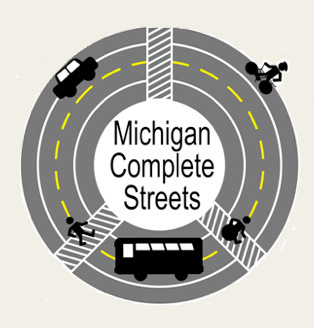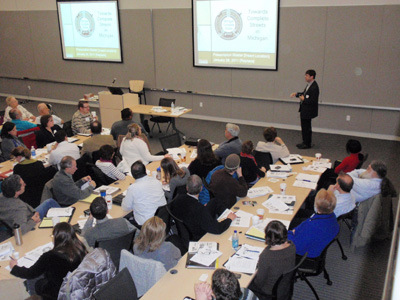You are currently browsing the tag archive for the ‘LSL Planning’ tag.
 On Friday, January 28, the Michigan Department of Community Health and Michigan Trails and Greenways Alliance launched the Complete Streets Institute. The Complete Streets Institute is a 5-module training series on Complete Streets spanning the basics of how to implementing projects. One hundred trainers, including bike, disabilities, and trail advocates, community officials, county health department staff, MSU Extension specialists, and transportation planners and engineers converged upon Lansing to receive a specialized, day-long training.
On Friday, January 28, the Michigan Department of Community Health and Michigan Trails and Greenways Alliance launched the Complete Streets Institute. The Complete Streets Institute is a 5-module training series on Complete Streets spanning the basics of how to implementing projects. One hundred trainers, including bike, disabilities, and trail advocates, community officials, county health department staff, MSU Extension specialists, and transportation planners and engineers converged upon Lansing to receive a specialized, day-long training.
 Brad Strader of LSL Planning presented the introductory and influencing policy modules, while Nancy Krupiarz of Michigan Trails and Greenways Alliance presented the stakeholder engagement module. The 100 trainers plan to take the information back to their constituents and jurisdictions. Several agencies and organizations will be launching Complete Streets Institute trainings across the state in the coming months. Stay tuned for dates and a location near you! For information about the Complete Streets Institute or trainers, please contact Holly Madill, MDCH Complete Streets Project Coordinator, at [email protected] or (517) 335-8372.
Brad Strader of LSL Planning presented the introductory and influencing policy modules, while Nancy Krupiarz of Michigan Trails and Greenways Alliance presented the stakeholder engagement module. The 100 trainers plan to take the information back to their constituents and jurisdictions. Several agencies and organizations will be launching Complete Streets Institute trainings across the state in the coming months. Stay tuned for dates and a location near you! For information about the Complete Streets Institute or trainers, please contact Holly Madill, MDCH Complete Streets Project Coordinator, at [email protected] or (517) 335-8372.
To date and our knowledge, 26 Michigan communities have passed Complete Streets policies (resolutions or ordinances), the most in the nation. If the population of all of those communities is added up, over 2,194,607 residents, or 22% of the state’s population, live under local Complete Streets policies that seek to provide its residents with transportation choices, more opportunities for physical activity, and a vibrant community.
| Module Title | Description |
| 1-Overview of Complete Streets | This module defines Complete Streets and explains its importance, history, and benefits, as well as its relationship to other associated topics. |
| 2-Stakeholder Engagement
|
This module introduces the various stakeholders of Complete Streets, explains how to work through a coalition to effect policy and projects, and provides messaging and communication tools and tips. |
| 3-Influencing Policy |
This module provides the tools needed to assess a community’s readiness for Complete Streets policies and the steps a community would take to implement them. In addition, the module defines and explains the policy-making processes and stakeholders, and Complete Streets laws. |
| 4-Complete Streets Planning and Regulations | This module explains policy implementation tools such as planning processes, policies, and regulations. |
| 5-Complete Streets Applications and Design | This module explains the design elements and various treatments/applications used to accomplish Complete Streets policy implementation (sidewalks, bike paths, transit stops, road diets, etc.) through project design. |















